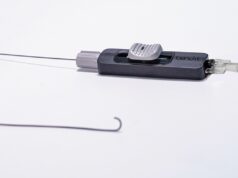
Synchron has announced the first human brain-computer interface (BCI) implant in the USA. This procedure represents a significant technological milestone for scalable BCI devices and is the first to occur in the USA using an endovascular BCI approach, which does not require invasive open-brain surgery, according to a Synchron press release.
The procedure was performed at Mount Sinai West in New York, USA and led by clinical investigator Shahram Majidi (Icahn School of Medicine at Mount Sinai, New York, USA). The procedure was performed in the angiography suite with a minimally invasive, endovascular approach. Mount Sinai’s Department of Rehabilitation and Human Performance helped coordinate the procedure.
The procedure marks the first US patient implant in Synchron’s COMMAND trial, which is being conducted under the first investigational device exemption (IDE) awarded by the US Food and Drug Administration (FDA) to a company assessing a permanently implanted BCI. The USA-based trial is being conducted with support from the National Institutes of Health (NIH) Neural Interfaces Program.
The COMMAND study will assess the safety and efficacy of the company’s motor BCI technology platform, including the Stentrode, in patients with severe paralysis—with the goal of enabling the patient to control digital devices hands-free. Study outcomes include the use of brain data to control digital devices and achieve improvements in functional independence.
“This is an incredibly exciting milestone for the field, because of its implications and huge potential,” said Majidi, who performed the procedure. “The implantation procedure went extremely well, and the patient was able to go home 48 hours after the surgery.”
“We are beyond excited to get to work with our patient, guiding them through the training process as they learn to use this device to live more independently and, most importantly, communicate with their family and friends,” said David Putrino (Mount Sinai Health System, New York, USA), principal investigator of the COMMAND study.
“The first in-human implant of an endovascular BCI in the USA is a major clinical milestone that opens up new possibilities for patients with paralysis,” said Tom Oxley, CEO and founder, Synchron. “Our technology is for the millions of people who have lost the ability to use their hands to control digital devices. We are excited to advance a scalable BCI solution to market—one that has the potential to transform so many lives.”
Synchron will continue to advance enrolment in its COMMAND trial as the industry-first FDA-approved clinical trial for a permanently implanted BCI in the USA. As per the release, recently reported long-term safety results have demonstrated this technology to be safe in four patients out to 12 months in Synchron’s SWITCH trial in Australia, as presented at the American Academy of Neurology’s 74th annual meeting (AAN 2022; 2–7 April, Seattle, USA).









